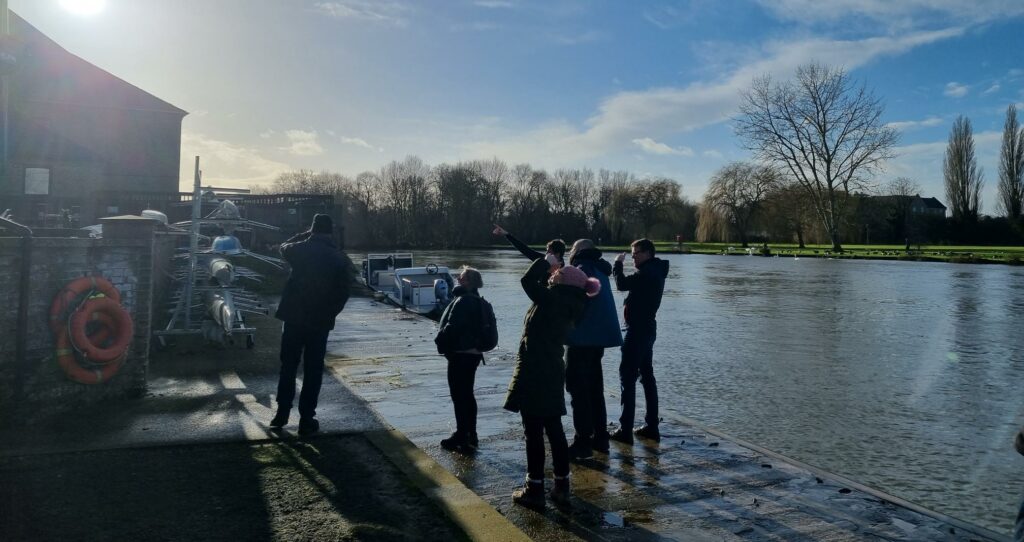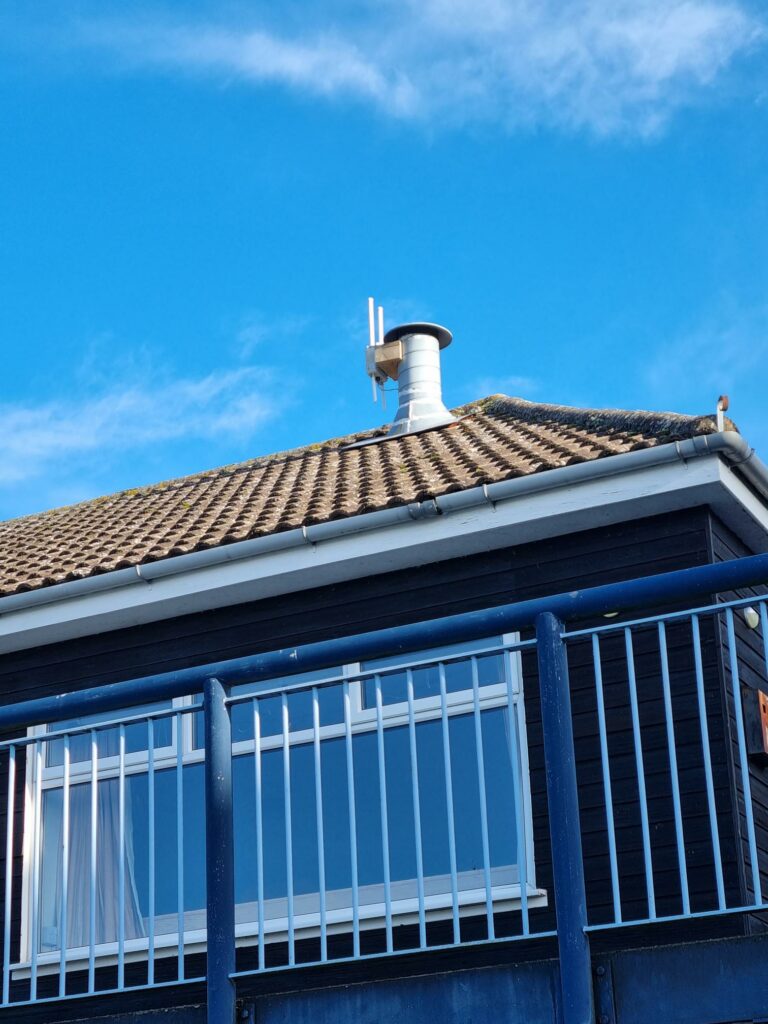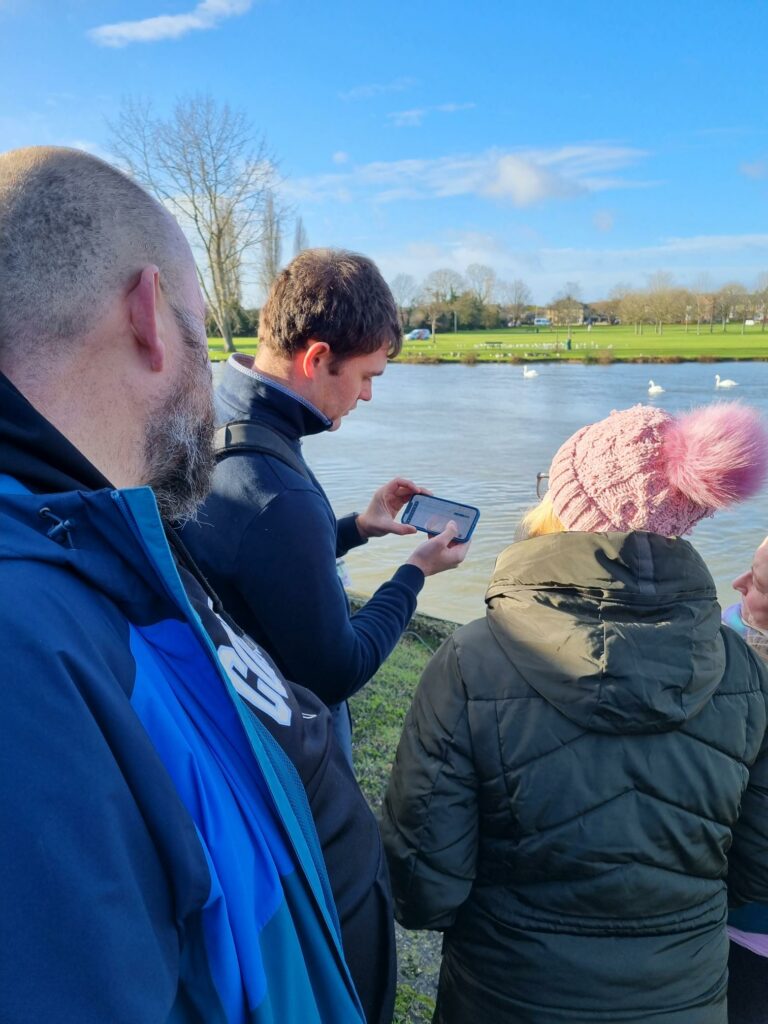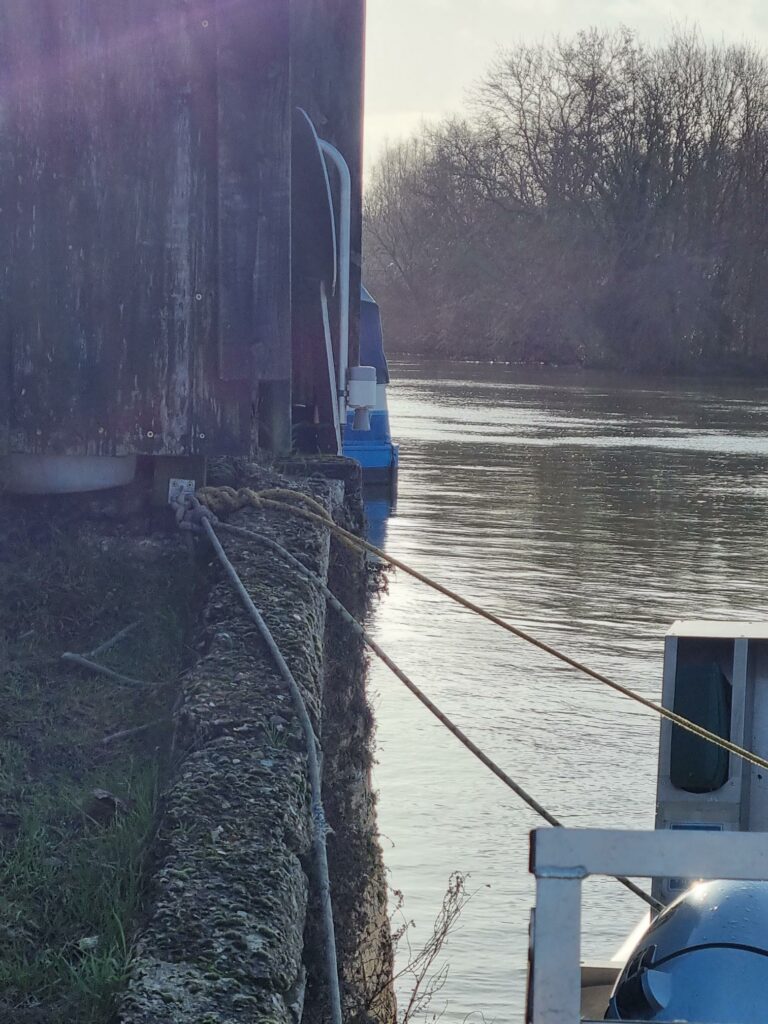Pilot project using smart technology to trial early flood risk notifications launched in St Neots

L-R: Cllr Ian Taylor, Cllr Simone Taylor, Dominic Chapman, Cllr Lara Davenport Ray, Cllr Stephen Ferguson and a member of the CCC Flood Team at St Neots Rowing Club looking up at the LoRa network equipment on the roof.
Local Councillors in St Neots spent time at the Rowing Club last week discovering why smart sensors capable of detecting river level rises are being trialled in vulnerable flood spots across Huntingdonshire.
The flood sensors offer the potential to provide messages about changes in water levels and are being trialled to see if triggering of early actions will help reduce the impact of flooding across the county.
This pilot project – joint funded by the Cambridgeshire & Peterborough Combined Authority and Huntingdonshire District Council (HDC) working in collaboration with Cambridgeshire County Council and Connecting Cambridgeshire – will investigate the use of low-cost sensors as a way to notify council officers and community flood groups about rising water levels.
Using smart technology to monitor flooding risks and water levels, the sensors – being installed by Cambridgeshire company cThings – will collect real-time river flow and water level data to help the district council identify problem areas. This means that in these identified areas early steps can be taken by community flood groups to reduce the impact of potential flooding – and relevant authorities can be made aware of these actions to see what difference they make.
Potential locations across Huntingdonshire have already been identified for the trial, with initial sensors being installed in up to six locations across St Neots, starting with the Rowing Club.
The Rowing Club was chosen as the first location, making use of the recently deployed LoRa network in the town to run the sensor. In this pilot project, the technology will be used to trigger early warning notifications about river levels as well as the water temperature for club users. This will be especially useful while the weather is colder so rowers can be made aware of changes in the water temperature. The sensors will likewise prove invaluable for the Dragon Boat crew, who had their boat unexpectedly washed away in 2021 by high levels of unpredicted flood water.
Sensors will also soon be in operation at Hen Brook, Fox Brook and Duloe Brook in St Neots, which are all known locally to have flooding problems.
This smart flood sensor pilot project is expected to highlight a variety of benefits to local communities. These include providing early risk notifications to flood group leaders so they can assess the local situation and informing localised council-led functions (e.g., in relation to road closures) and community-led projects (such as clearing of gullies) to help reduce the risk of disruption for residents.
HDC Executive Councillor for leisure, waste and street scene, Cllr Simone Taylor said: “We’re incredibly pleased that St Neots was chosen to be part of this initial pilot project trialling sensors to combat the risk of flooding. Huntingdonshire District Council is part of the Cambridgeshire & Peterborough Flood & Water Management Partnership, and it is part of our strategy to address predicted and historical flooding issues across the county to focus on how local communities can adapt and be more resilient to flood risk.”
HDC Executive Councillor for climate and environment, Cllr Lara Davenport Ray, added: “Being able to notify the local communities and the flood risk teams in advance about potential rising water levels – to enable them to take early interventions – is of incredible value.”
Deputy Mayor of Cambridgeshire & Peterborough Combined Authority, Cllr Anna Smith, said: “The Combined Authority provides funding for Connecting Cambridgeshire to deliver trials of innovative technologies. That includes both these smart water level sensors and an expansion of the LoRa network on which they will operate.
“Water management is an increasingly important issue for our region and the Combined Authority is working with communities to develop a better grasp of flood risks across Cambridgeshire. Forewarned is forearmed and these sensors can notify community flood groups so that they can respond more quickly to manage the risks and reduce danger.
“This pilot will ultimately benefit the whole area. Trialling smart sensing technology will gather sharper and more timely data on water flow and rising levels. That means that threats can be detected earlier, residents and businesses warned, and actions taken to help keep them safe.”
St Ives will be next to benefit from the same trial, using sensors to detect and prevent flooding by collecting real-time river level and flow data in three areas. Followed by Alconbury, Bartlow, Broughton, Buckden and Kimbolton, plus other highway locations with known flooding issues.
The early advice being sent out by the sensors during this pilot project will be separate from the existing flood warning messages received by residents and communities from the Environment Agency*. These local trial messages will not affect or replace the Environment Agency’s flood warning service but will complement their current warnings.
After the initial trial has ended, the impact of the data collected will offer insight into the potential for the development of other flood risk schemes across Cambridgeshire and Peterborough.
Better understanding of the benefits of these notifications will also inform local councils and residents how best to respond in a timely manner to help relieve some of the pressures that result in flooding.
It is hoped the pilot project will provide a template to allow more Community Flood Groups to apply to self-fund sensors, and the ongoing maintenance needed, which would allow them to better manage and reduce the risk of flooding to keep their communities safe.
In March 2021 funding was approved by Cambridgeshire County Council for a programme of works across Cambridgeshire aimed at increasing community resilience to flooding, and these trial deployments will support his work. Their programme of work has been named the Community Flood Action programme and more details can be found on the county council website.
The Environment Agency also host guidance for developing flood plans (community, business and personal plans) and have a community flood plan template.
Sign up for Environment Agency flood alerts in your area or report a flood using the county council flood reporting form.



*Environment Agency
The Environment Agency provides a flood warning service throughout England and Wales in areas at risk of flooding from rivers or the sea. Using the latest available technology, staff monitor rainfall, river levels and sea conditions 24 hours a day and use this information to forecast the possibility of flooding. If flooding is likely alerts and warnings are issued to the public and risk management authorities, like the county and district councils, to respond and carry out actions to protect infrastructure or homes.
Related Posts

Digital Switchover Awareness Campaign and Events for SMEs in Cambridgeshire and Peterborough

CORE’s 5G network trial and Augmented Reality Experience showcases the future of live events

